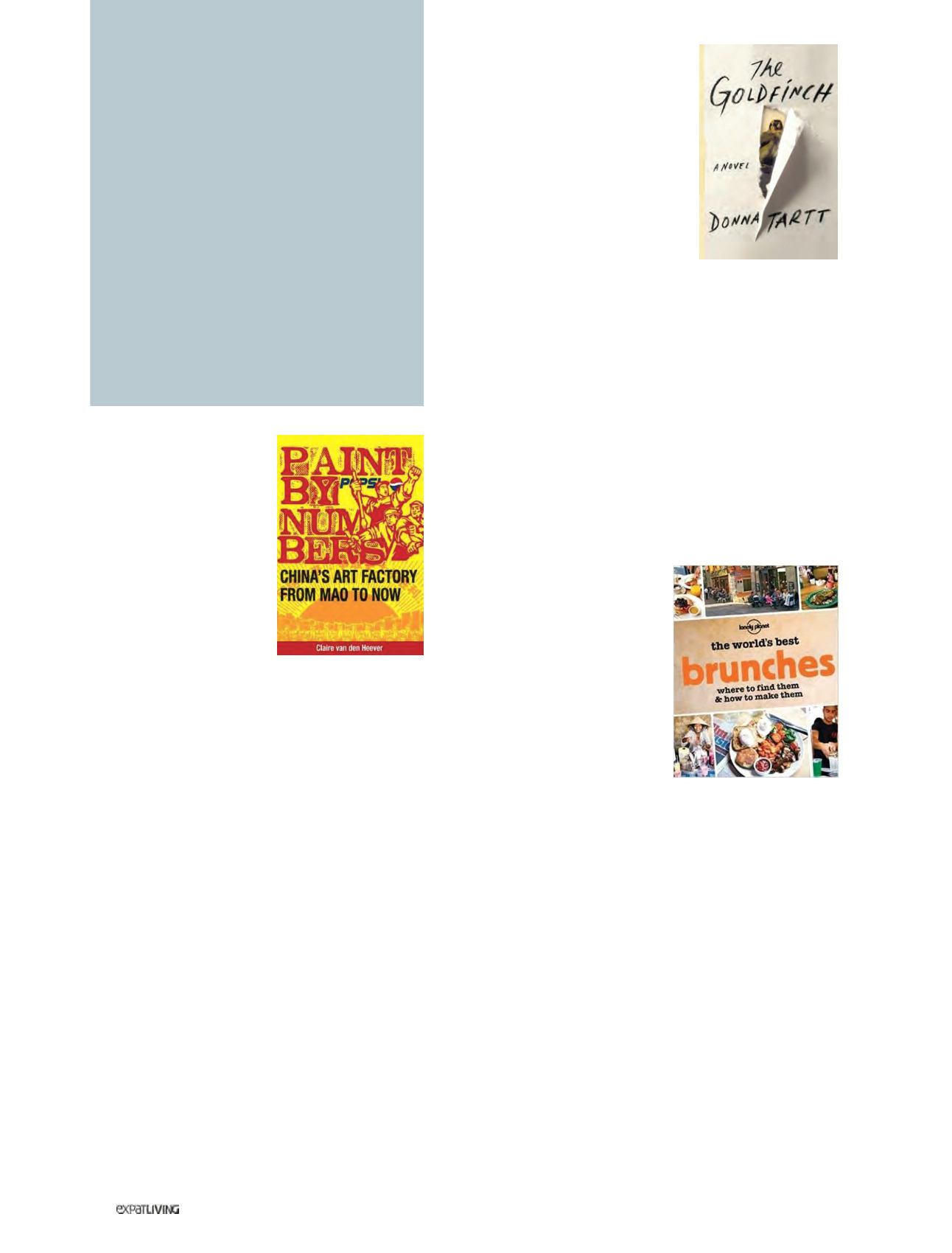

184
April15
ON THE
PAGE
ARTS&LEISURE
If you’re looking for a good read this
month, here are our thoughts on a
selection of recent releases.
PAINT BY NUMBERS:
CHINA’S ART FACTORY
FROM MAO TO NOW
Claire van den Heever
Earnshaw Books | 228 pages
Ever wished you knew more
about the background to
and personalities behind the
fabulous Chinese artwork
that glows from the walls of
Singapore galleries such as
Ode to Art (to mention just
one)? If so, this ambitious, comprehensive, scholarly yet
eminently readable debut book by South African Claire
van den Heever is exactly what you need.
She had me by the preface, a crackling account of
Sotheby’s first auction of contemporary Asian art, in March
2006, when Ziang Xiaogang’s
Bloodline Series: Comrade
No. 120
sold for just shy of US$1 million. That “got the
ball rolling”, to put it mildly.
I was fascinated by her history of Mao’s Cultural
Revolution and the propaganda art that was such an
integral part of that era; and then her account of the
fledgling development of a sort of artistic freedom during
the eighties. Her evocation of the Tiananmen Square
Massacre of 4 June 1989 – a turning point after which
nothing was the same – is outstanding.
Claire’s research for this book involved spending several
years in China and learning Mandarin, before interviewing
critics, curators, collectors – and 15 of the country’s best-
known contemporary artists, pioneers all of the early
eighties’ avant-garde movement.
As her publisher says, in telling the 35-year-old story
of Chinese contemporary art, from “mass-produced
propaganda in the Mao era” to the “market darling” of
today, it looks not just at China’s art scene and the art
itself, but also at the politics of art in China.
A great read for anyone who’s interested in art or in
China.
Verne Maree
THE GOLDFINCH
Donna Tartt
Little, Brown | 784 pages
I recommended this novel to my book
club, largely because it had won the
Pulitzer Prize in 2014 and is the third novel
from this author since her debut novel
The Secret History
(1992), which I consider one of the best books
I’ve ever read. I had not taken into consideration, though, that it was
over 700 pages long and I would have to carry around a kilogram’s
worth of reading for two months before getting to the end.
I found the story well-written and enjoyable until about page 400.
The character development of the protagonist, Theo, was interesting
and was left unresolved throughout, which I thought was an unusual
approach.
However, I felt the author was not prepared to let go of her book
and dragged it out to well beyond its natural life. As a result, I lost
interest and ended up skimming through the last hundred or so
pages – partly, I admit, so that I would not have to lug it back on the
plane. If you have to read the Pulitzer Prize-winners, then do read
this one, but only if you have more time on your hands than I do.
Alix Burrell
THE WORLD’S BEST BRUNCHES
– WHERE TO FIND THEM & HOW
TO MAKE THEM
Foreword by Bill Granger
Lonely Planet | 222 pages
Popular Aussie restaurateur Bill
Granger is a huge fan of brunch. As
he rightly says, there is no other meal
that can be stretched out from 9am
to 5pm, depending on who you are,
your stage in life and what your mood
dictates. Sure, he adds, it’s a luxury –
like afternoon tea, but we need these feel-good rituals that give us
the chance to reconnect with friends, families, food and ourselves.
And the fact that brunch is not on the everyday schedule that the
traditional three meals punctuate, “gives it an air of spontaneous,
unstructured, devil-may-care abandon that we all deserve to indulge
in from time to time”.
After Bill has set the tone, the rest of this well-conceived
publication goes on to present an eclectic selection of potential
brunch fare from around the world, from Brazil’s açai bowl, Egypt’s
ful medames
and Israeli
sabich
to Southern Indian
idli
with coconut
relish and fresh tomato ketchup from the US.
Each is presented as a double-page spread: on the left, a description
of the item, its origin, what it tastes like, and a specific recommendation
for a restaurant where you can get it. For example, get your Spanish
omelette at Mesón de la Tortilla in Pamplona for just 7 euros. And on
the right – wonderful! – a clear and detailed recipe for making it.
A host of food and travel writers from throughout the world
contributed content to this scrumptious book. Warning: don’t read
it on an empty stomach unless you (a) are prepared to zoot out
immediately to hunt down brunch, or (b) have a well-stocked kitchen.
Verne Maree



















